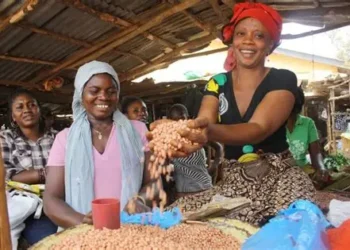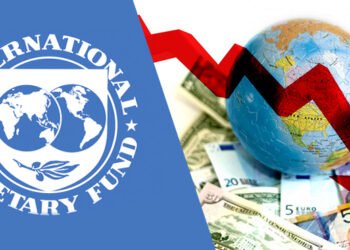Ghana’s battle against inflation has reached a critical milestone, with annual inflation slowing to a 28-month low in July 2024.
This development marks a significant achievement in the central bank’s ongoing efforts to control price growth and stabilize the economy. The slowdown in inflation not only brings relief to consumers but also opens the door for potential monetary policy easing later this year.
According to Ghana’s Government Statistician, Samuel Kobina Annim, consumer prices rose by 20.9% in July, the slowest pace since March 2022. This is a notable decrease from the 22.8% recorded in June and a better-than-expected outcome, as the median forecast from a Bloomberg survey of four economists predicted a 21.5% rise.
This decline in inflation reflects a positive shift in the country’s economic landscape, signaling that the central bank’s efforts to curb inflation are beginning to bear fruit.
Bank of Ghana’s Monetary Policy Dilemma
For more than three years, Ghana’s annual inflation rate has exceeded the upper limit of the Bank of Ghana’s (BoG) target range, which is set at 10%. Despite this persistent inflationary pressure, the central bank surprised markets in January by cutting its key interest rate. However, since that initial cut, the BoG has maintained the rate at 29%, largely due to concerns over the weak local currency, the cedi, which has complicated the outlook for consumer price growth.
Governor Ernest Addison, in the July 26 monetary policy committee meeting, highlighted the challenges that continue to pose risks to inflation. Addison pointed to exchange-rate pressures, along with increases in utility tariffs and fuel prices, as factors contributing to a “slightly elevated inflation profile for the year.” These concerns underscore the delicate balance the central bank must strike between supporting economic growth and ensuring price stability.
Ghana’s economic outlook is also influenced by external factors, particularly the actions of the U.S. Federal Reserve. If the Fed decides to cut its key interest rate in September, this could alleviate some of the pressure on emerging markets like Ghana. According to Mark Bohlund, a senior credit research analyst at REDD Intelligence, such a move by the Fed could provide the BoG with greater confidence to resume its monetary easing without putting undue pressure on the cedi.
The cedi’s stability is crucial for controlling inflation in Ghana, as a weaker currency drives up the cost of imported goods, fueling price increases. The central bank’s caution in adjusting interest rates reflects the need to maintain a stable exchange rate while also fostering an environment conducive to economic growth.
IMF Support and Market Sentiment
Ghana’s economic reforms, supported by a $3 billion program with the International Monetary Fund (IMF), are beginning to bolster market sentiment. The expectation of further loan disbursements as part of this program has helped improve the outlook for the nation’s economy. These reforms are seen as critical for addressing the structural challenges that have contributed to Ghana’s inflationary pressures.
The IMF program, coupled with ongoing domestic reforms, aims to stabilize the economy, reduce the fiscal deficit, and enhance investor confidence. As these measures take effect, they are expected to create a more favorable environment for the central bank to consider further rate cuts.
As inflation continues to decelerate, the Bank of Ghana faces a pivotal decision at its next interest-rate meeting on September 30. If the downward trend in inflation persists through August, the central bank may find itself in a stronger position to ease monetary policy. Such a move would be aimed at supporting economic growth by reducing borrowing costs for businesses and consumers.
However, any decision to cut rates will need to be weighed carefully against the risks of rekindling inflationary pressures, particularly if external factors, such as global commodity prices or exchange-rate fluctuations, take a negative turn. The BoG’s ability to navigate these challenges will be crucial in determining the success of its monetary policy strategy.
Ghana’s achievement in slowing inflation to a 28-month low is a testament to the central bank’s efforts to stabilize the economy amidst challenging conditions. As the Bank of Ghana prepares for its upcoming interest-rate decision, the focus will be on maintaining this momentum while carefully managing the risks that could undermine the progress made so far.
With the potential for further rate cuts on the horizon, Ghana’s economic outlook may be set for a positive turn, provided the central bank can strike the right balance between fostering growth and controlling inflation.
READ ALSO: Politics Enters ‘Silly Season’, Says Franklin Cudjoe























